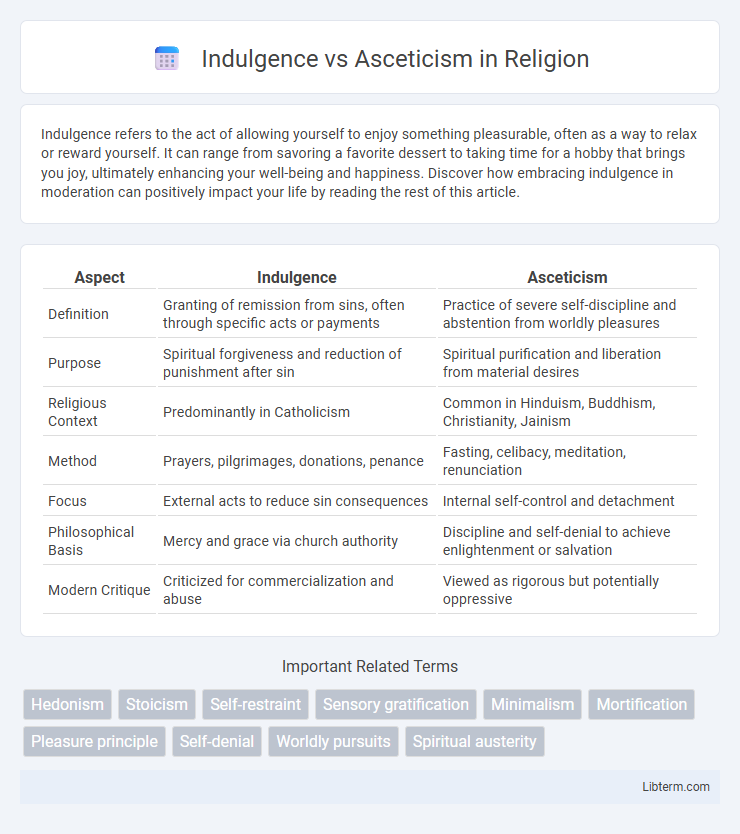Indulgence refers to the act of allowing yourself to enjoy something pleasurable, often as a way to relax or reward yourself. It can range from savoring a favorite dessert to taking time for a hobby that brings you joy, ultimately enhancing your well-being and happiness. Discover how embracing indulgence in moderation can positively impact your life by reading the rest of this article.
Table of Comparison
| Aspect | Indulgence | Asceticism |
|---|---|---|
| Definition | Granting of remission from sins, often through specific acts or payments | Practice of severe self-discipline and abstention from worldly pleasures |
| Purpose | Spiritual forgiveness and reduction of punishment after sin | Spiritual purification and liberation from material desires |
| Religious Context | Predominantly in Catholicism | Common in Hinduism, Buddhism, Christianity, Jainism |
| Method | Prayers, pilgrimages, donations, penance | Fasting, celibacy, meditation, renunciation |
| Focus | External acts to reduce sin consequences | Internal self-control and detachment |
| Philosophical Basis | Mercy and grace via church authority | Discipline and self-denial to achieve enlightenment or salvation |
| Modern Critique | Criticized for commercialization and abuse | Viewed as rigorous but potentially oppressive |
Understanding Indulgence and Asceticism
Indulgence refers to the practice of allowing oneself to enjoy pleasures, especially sensory or material gratification, emphasizing comfort, luxury, and personal satisfaction. Asceticism, in contrast, involves self-discipline and abstention from physical pleasures, often for spiritual, ethical, or philosophical reasons, promoting restraint and simplicity. Understanding indulgence and asceticism requires recognizing their roles as opposing approaches to human desires, where indulgence seeks fulfillment through external enjoyment and asceticism pursues inner growth through denial and self-control.
Historical Roots of Indulgence and Asceticism
Indulgence and asceticism trace their historical roots to ancient religious and philosophical traditions, with indulgence often linked to hedonistic practices in Greco-Roman cultures and asceticism rooted in early Hinduism, Buddhism, and Christianity promoting self-discipline and renunciation. In these traditions, indulgence emphasized sensory pleasure and material wealth as paths to fulfillment, whereas asceticism prioritized spiritual purity and detachment from worldly desires. The contrasting ideologies shaped cultural norms and moral frameworks, influencing societal attitudes toward morality and personal conduct throughout history.
Cultural Perspectives on Pleasure and Restraint
Cultural perspectives on indulgence and asceticism vary widely, shaping attitudes toward pleasure and restraint based on historical, religious, and social contexts. Societies valuing indulgence often associate pleasure with happiness and self-expression, while ascetic cultures emphasize discipline, self-control, and spiritual growth as pathways to fulfillment. This dynamic interplay influences practices from dietary habits to festivals, reflecting broader worldviews on human desires and moral values.
Philosophical Foundations: Hedonism vs. Stoicism
Hedonism, rooted in ancient Greek philosophy, asserts that pleasure is the highest good and primary motivation for human life, emphasizing indulgence as a path to happiness. Stoicism, founded by Zeno of Citium, advocates for asceticism through self-control, virtue, and rationality, teaching that true contentment arises from accepting fate and mastering desires. These contrasting philosophical foundations frame indulgence as the pursuit of external pleasure while asceticism promotes inner resilience and moral discipline.
Psychological Impacts of Indulgence and Asceticism
Indulgence often leads to immediate gratification and heightened dopamine activity, which can temporarily boost mood but may increase vulnerability to anxiety and impulsivity over time. Asceticism promotes self-discipline and delayed gratification, contributing to improved emotional regulation, resilience, and reduced stress levels through the activation of prefrontal cortex pathways. Balancing indulgence and asceticism is crucial for psychological well-being, as extremes in either can disrupt mental health and cognitive functioning.
Religious Views on Moderation and Self-Denial
Religious views on indulgence versus asceticism emphasize moderation and self-denial as central means to spiritual growth, with many traditions advocating restraint from excessive pleasures to achieve higher states of consciousness or divine favor. In Christianity, ascetic practices such as fasting and celibacy serve to purify the soul and cultivate humility, while in Buddhism, the Middle Way promotes balanced living, avoiding both extreme indulgence and severe asceticism to attain enlightenment. Hinduism also upholds self-discipline (tapas) as essential for spiritual progress, encouraging devotees to transcend sensory desires through meditation and renunciation.
Indulgence in Modern Consumer Society
Indulgence in modern consumer society is characterized by the prioritization of immediate gratification through the consumption of luxury goods, entertainment, and experiences. This cultural trend emphasizes material wealth and sensory pleasure as key indicators of success and happiness, often driven by aggressive marketing and social media influence. The pervasive availability of products and services fuels continuous desire, reinforcing consumerism and shaping lifestyles centered around excess and comfort.
Ascetic Practices in Contemporary Life
Ascetic practices in contemporary life emphasize self-discipline, minimalism, and intentional living to counteract consumerism and instant gratification. These practices often include fasting, meditation, digital detoxes, and voluntary simplicity, fostering mental clarity and emotional resilience. Modern asceticism supports sustainable lifestyles and spiritual growth by prioritizing meaningful experiences over material accumulation.
Balancing Indulgence and Asceticism for Well-Being
Balancing indulgence and asceticism plays a crucial role in promoting overall well-being by allowing individuals to enjoy life's pleasures without overconsumption while practicing self-discipline to maintain mental and physical health. Integrating mindful indulgence with structured ascetic practices helps regulate emotional states, reduce stress, and enhance resilience. Achieving harmony between these contrasting approaches fosters sustained happiness, personal growth, and a more balanced lifestyle.
Choosing a Path: Personal Growth and Fulfillment
Choosing between indulgence and asceticism shapes personal growth by balancing immediate pleasure and long-term fulfillment. Indulgence encourages exploration of desires, boosting creativity and self-awareness, while asceticism fosters discipline, resilience, and inner peace through self-control and minimalism. Aligning lifestyle choices with core values enhances overall well-being and sustainable happiness.
Indulgence Infographic

 libterm.com
libterm.com